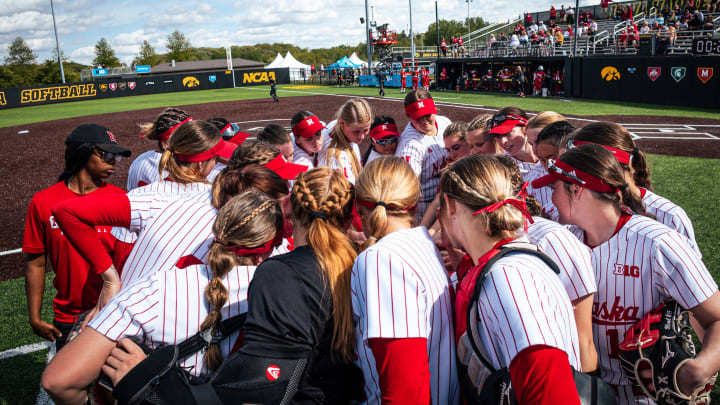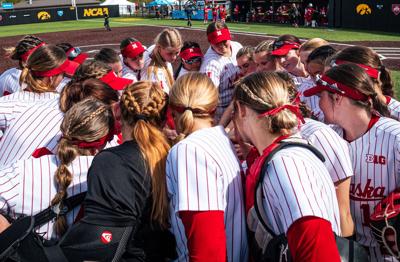
At the conclusion of their college softball season in May, Nebraska players brought complaints to the university about their coach, Rhonda Revelle.
The players detailed what they said was systematic emotional abuse and a toxic culture on the team that included fat-shaming, verbal abuse and erratic and harassing behavior by Revelle.
In response, Revelle, 57, who has been in charge of the team for 27 years, was placed on paid administrative leave and the school conducted an internal investigation that lasted for weeks.
On Aug. 25, on the eve of the new school year, Athletic Director Bill Moos gathered the team for an announcement: Revelle would be reinstated.
In its news release, the school said no one affiliated with the athletic department — from administrators to coaches to players — would be available to comment further.
The events — both the allegations against Revelle and the school’s response — have left the team reeling, according to interviews with nine people, including parents of players and seven current and former players who gave statements to the investigators. All spoke on the condition of anonymity out of concern they could face retaliation from the school.
The episode highlights the limited avenues available to college athletes who feel they have been mistreated by coaches.
“This solidifies why more student-athletes don’t come forward, why they stay silent,” one current Nebraska player said. “Who listens to us? Who are we supposed to talk to? How do we have a voice in anything?”
In recent weeks, Nebraska players have reached out to Tim Nevius, a former NCAA investigator who says he believes college sports stakeholders do far too little to protect athletes.
He formed a new group this year, the College Athlete Advocacy Initiative, that provides legal services and advice to college athletes.
“I think Nebraska missed an opportunity to take seriously the athletes’ concerns about the program,” Nevius said. “They essentially disregarded the athletes’ serious complaints.”
The Nebraska players attempted to use one route available to them in the spring. At the conclusion of each season, players fill out surveys about their experience with the team.
The responses are anonymous but require identifying information, such as the player’s year in school and the amount of scholarship money she receives. Softball has 13 full scholarships that are divided among a roster of about 20 players.
On last season’s surveys, to protect their anonymity while detailing their concerns, the vast majority of players wrote they were seniors on full scholarships and then alleged they had been verbally abused and harassed by Revelle.
The allegations prompted a meeting with Moos, during which they shared additional details. They told Moos that the majority of players on the team last season had sought counseling from athletic department psychologists and that the treatment was the reason multiple players had transferred out of the program.
One member of the team told Moos she had had suicidal thoughts because of the toxic climate of the team. The players told Moos they were scared to return in the fall to play for Revelle.
Afterward, Revelle was placed on paid leave, and an internal review commenced, during which players were cautioned not to speak about the probe publicly and not to obtain their own legal representation.
Outside lawyers were hired to interview players, who provided an even fuller picture. Players said Revelle asked them to report to her on each other’s love lives and texted players at all hours of the day and night. In one instance, a player said Revelle texted her nearly 100 times over the course of one afternoon.
One recent former player said she suffered an injury during a game, and while lying in bed that night crying in pain, she received harassing text messages from Revelle questioning her injury.
According to several players, investigators were told of another former player who was bullied into playing through a thumb injury only to be told by a family doctor who examined her that she should have been in a cast for a month.
Her family covered the medical bills out of pocket. Investigators also were told of a player who was in a serious car accident and said she was rushed straight to an away game without receiving a concussion test and later suffered headaches and post-concussion symptoms.
Asked this week about these and other specific allegations, the Nebraska athletic department responded with a statement that read:
“First and foremost the well-being of our student-athletes will always be the top priority at the University of Nebraska. As previously stated, the concerns brought forward by members of our softball program were taken very seriously.
“We initiated a comprehensive review, and Coach Revelle and her staff understand the seriousness of the student-athlete concerns.
As a result of the issues that were raised we have worked with Coach Revelle to address and alleviate those concerns moving forward. The University cannot comment further on a personnel matter.”
An athletic department spokesperson said that Revelle was aware of the specific allegations and that she declined to comment.
At the meeting at which Moos told the team Revelle was being reinstated, players asked for a copy of the investigation report. They later were told by an athletic department official that they could not see it.
“They basically said to us you got the review and they need to get back to doing their jobs,” one former player said. “We’re a small sport, and we should be happy they even did a review. But we feel betrayed. We want our story to be told.”
The school declined to answer why players were denied access to the report or whether Revelle and her representatives had seen it.
There are no NCAA rules with penalties governing coaches’ behavior and player injuries, only guidelines. Between 2013 and 2016, Inside Higher Ed counted accusations of coaching abuse at 20 colleges.
In some cases, coaches face consequences. This year, North Carolina women’s basketball coach Sylvia Hatchell resigned after making racially insensitive comments and forcing players to play through injuries.
Three years ago, George Washington fired men’s basketball coach Mike Lonergan after players complained of verbal and emotional abuse.
